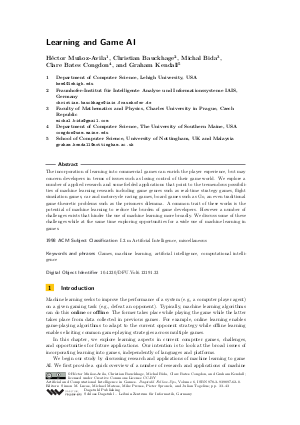Learning and Game AI
Authors Hector Muñoz-Avila, Christian Bauckhage, Michal Bida, Clare Bates Congdon, Graham Kendall
-
Part of:
Volume:
Artificial and Computational Intelligence in Games (DFU - Vol. 6)
Part of: Series: Dagstuhl Follow-Ups (DFU) - License:
 Creative Commons Attribution 3.0 Unported license
Creative Commons Attribution 3.0 Unported license
- Publication Date: 2013-11-18
File

PDF
DFU.Vol6.12191.33.pdf
- Filesize: 0.68 MB
- 11 pages
Document Identifiers
Subject Classification
Keywords
- Games
- machine learning
- artificial intelligence
- computational intelligence
Metrics
- Access Statistics
-
Total Accesses (updated on a weekly basis)
0PDF Downloads0Metadata Views
Abstract
The incorporation of learning into commercial games can enrich the player experience, but may concern developers in terms of issues such as losing control of their game world. We explore a number of applied research and some fielded applications that point to the tremendous possibilities of machine learning research including game genres such as real-time strategy games, flight simulation games, car and motorcycle racing games, board games such as Go, an even traditional game-theoretic problems such as the prisoners dilemma. A common trait of these works is the potential of machine learning to reduce the burden of game developers. However a number of challenges exists that hinder the use of machine learning more broadly. We discuss some of these challenges while at the same time exploring opportunities for a wide use of machine learning in games.
Cite As Get BibTex
Hector Muñoz-Avila, Christian Bauckhage, Michal Bida, Clare Bates Congdon, and Graham Kendall. Learning and Game AI. In Artificial and Computational Intelligence in Games. Dagstuhl Follow-Ups, Volume 6, pp. 33-43, Schloss Dagstuhl – Leibniz-Zentrum für Informatik (2013)
https://doi.org/10.4230/DFU.Vol6.12191.33
BibTex
@InCollection{munozavila_et_al:DFU.Vol6.12191.33,
author = {Mu\~{n}oz-Avila, Hector and Bauckhage, Christian and Bida, Michal and Congdon, Clare Bates and Kendall, Graham},
title = {{Learning and Game AI}},
booktitle = {Artificial and Computational Intelligence in Games},
pages = {33--43},
series = {Dagstuhl Follow-Ups},
ISBN = {978-3-939897-62-0},
ISSN = {1868-8977},
year = {2013},
volume = {6},
editor = {Lucas, Simon M. and Mateas, Michael and Preuss, Mike and Spronck, Pieter and Togelius, Julian},
publisher = {Schloss Dagstuhl -- Leibniz-Zentrum f{\"u}r Informatik},
address = {Dagstuhl, Germany},
URL = {https://drops.dagstuhl.de/entities/document/10.4230/DFU.Vol6.12191.33},
URN = {urn:nbn:de:0030-drops-43348},
doi = {10.4230/DFU.Vol6.12191.33},
annote = {Keywords: Games, machine learning, artificial intelligence, computational intelligence}
}
